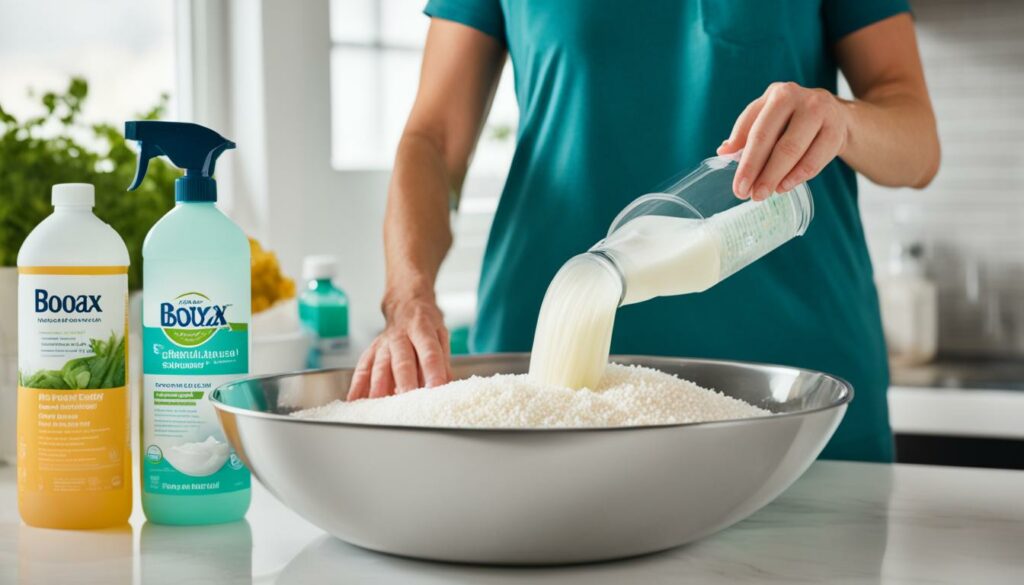Are you tired of spending a fortune on store-bought laundry detergents that are loaded with harsh chemicals? What if I told you that you could make your own detergent at home, using simple ingredients and a straightforward process? Yes, it’s possible!
In this easy DIY guide, we will take you through the step-by-step process of making your own homemade laundry detergent. Not only will you save money, but you’ll also have complete control over the ingredients, making it a safer and more eco-friendly option for your family and the environment.
So, are you ready to revolutionize your laundry routine and discover the wonders of homemade laundry detergent? Let’s dive in!
Discover the Benefits of Homemade Laundry Detergent
Eco-Friendly and Cost-Effective Solutions
One of the significant advantages of using homemade laundry detergent is its eco-friendliness. Commercial detergents often contain harsh chemicals that can harm the environment when they are washed down the drain. In contrast, homemade laundry detergent typically utilizes natural ingredients that are safer for the planet. By opting for an eco-friendly laundry soap, you can reduce your environmental impact and contribute to a more sustainable future.
Another benefit of homemade laundry detergent is its cost-effectiveness. Store-bought detergents can be quite expensive, especially if you have a large household and do numerous loads of laundry each week. Making your own detergent allows you to save money in the long run, as the ingredients used are often more affordable and can last for multiple batches. With a cost-effective detergent, you can maintain a clean and fresh wardrobe without breaking the bank.
Avoiding Harmful Chemicals in Commercial Detergents
Commercial detergents often contain synthetic fragrances, optical brighteners, and other potentially harmful chemicals that can irritate sensitive skin or cause allergic reactions. Homemade laundry detergent offers a safer alternative, as you have control over the ingredients used. By customizing your detergent recipe, you can exclude any substances that may cause skin irritation, making it suitable for individuals with sensitive skin. With homemade detergent, you can ensure that your clothes are clean and fresh without compromising your skin’s health.
Customizing Your Detergent for Sensitive Skin
One of the unique benefits of homemade laundry detergent is the ability to customize it for individuals with sensitive skin. Some people may be more prone to skin allergies or have specific sensitivities to certain ingredients commonly found in commercial detergents. By making your own detergent, you can tailor the recipe to suit your specific needs. You can choose fragrance-free options, use gentle soaps, or incorporate natural additives that are known to be soothing for sensitive skin. Customizing your detergent ensures a safe and comfortable laundry experience for you and your family.
| Benefits of Homemade Laundry Detergent | Eco-Friendly and Cost-Effective Solutions | Avoiding Harmful Chemicals in Commercial Detergents | Customizing Your Detergent for Sensitive Skin |
|---|---|---|---|
| Reduces environmental impact | Saves money in the long run | Avoids synthetic fragrances and irritants | Tailored to individual sensitivities |
| Uses natural, safer ingredients | Affordable and long-lasting | Allows for skin-friendly customization | Soothes sensitive skin |
| Contributes to a sustainable future | Effective in cleaning clothes |
How to Make Your Own Laundry Detergent
If you’re looking to save money and reduce your environmental impact, making your own laundry detergent is a great solution. Not only is it a straightforward process, but it also allows you to customize the detergent to suit your needs. Here is a step-by-step guide on how to create your own homemade laundry detergent.
Gather Your Ingredients and Equipment
Before you begin, it’s important to gather all the necessary ingredients and equipment. Here’s what you’ll need:
- 1 bar of soap (Castile soap or Fels Naptha)
- 1 cup of Borax
- 1 cup of washing soda
- A grater
- A mixing bowl
- A container for storage
Step-by-step Instructions
Follow these simple instructions to make your own laundry detergent:
- Grate the bar of soap using a grater. This will create fine soap flakes that will dissolve easily in water.
- In a mixing bowl, combine the grated soap, Borax, and washing soda. Mix well to ensure that the ingredients are evenly distributed.
- Transfer the mixture to a container for storage. Ensure that the container is airtight to keep your detergent fresh.
- Use approximately 2 tablespoons of detergent for a regular load of laundry. Adjust the amount based on the size of your load and the level of dirtiness.
- Store the remaining detergent in a cool, dry place for future use.
That’s it! You now have your own homemade laundry detergent ready to use. It’s a cost-effective and eco-friendly alternative to store-bought options.
With just a few simple ingredients and easy steps, you can make your own laundry detergent and take control of what goes into your washing. Give it a try and experience the satisfaction of creating something useful and sustainable.
Choosing Your Homemade Laundry Detergent Ingredients
When it comes to making your own homemade laundry detergent, selecting the right ingredients is crucial. The choice between Castile soap and Fels Naptha is a common decision to make. Both soaps have their merits, so let’s explore the differences.
Selecting the Right Soap: Castile Soap vs. Fels Naptha
Castile soap, made from plant oils, is known for its gentle and natural properties. It is a popular choice among those with sensitive skin or allergies. On the other hand, Fels Naptha is a multipurpose soap that has powerful stain-removing capabilities, making it ideal for heavily soiled laundry.
Understanding the Role of Borax and Washing Soda
In addition to soap, two other key ingredients in homemade laundry detergent are Borax and washing soda. Borax acts as a natural laundry booster and stain remover, helping to break down dirt and grime. Washing soda, also known as soda ash or sodium carbonate, enhances the cleaning power of the detergent and helps to soften water for better cleaning results.
The Power of Oxiclean: A Natural Whitening Agent
When it comes to brightening and whitening your laundry, Oxiclean is a game-changer. This natural whitening agent uses the power of oxygen to remove tough stains and leave your clothes looking pristine. Simply add a scoop of Oxiclean to your homemade detergent for outstanding results.
Incorporating these ingredients into your homemade laundry detergent recipe will ensure effective cleaning and give you the desired results. Experiment with different combinations to find the perfect formula that works for you.
The Homemade Laundry Detergent Making Process
Making your own laundry detergent at home is a rewarding and cost-effective solution that allows you to have full control over the ingredients you use. By following a simple step-by-step process, you can create a homemade laundry detergent that is both effective and eco-friendly. In this section, we will provide you with a detailed overview of the entire process, from grating the soap to storing your DIY detergent.
Preparation: Grating Your Soap
The first step in making homemade laundry detergent is grating your soap. Start by choosing a high-quality soap, such as Castile soap or Fels Naptha, and use a grater to create fine shavings. Grating the soap helps it dissolve easily and ensures even distribution throughout your detergent.
Pro Tip: To make grating easier, freeze the soap for an hour before grating. This will make the soap firmer and less likely to become sticky.
Mixing the Ingredients: A Step-by-Step Guide
Once you have grated your soap, it’s time to mix the ingredients together. Here’s a step-by-step guide to help you:
- Measure out 2 cups of grated soap and transfer it to a large mixing bowl.
- Add 1 cup of washing soda and 1 cup of Borax to the bowl.
- Using a spoon or gloved hands, mix the ingredients together until well combined.
- For an extra boost of cleaning power, you can also add ½ cup of Oxiclean to the mixture.
Pro Tip: To prevent clumping, sift the ingredients together before mixing. This will ensure a smooth and consistent detergent.
Tips for Storing Your DIY Laundry Detergent
Now that you have made your own homemade laundry detergent, it’s important to store it properly to maintain its effectiveness. Here are some tips:
- Transfer the detergent to an airtight container, such as a glass jar or plastic tub, to prevent moisture from affecting its quality.
- Label the container with the date of creation to keep track of its freshness.
- Place the container in a cool and dry location to extend its shelf life.
Pro Tip: For easy dosing, use a ¼ cup measuring scoop to dispense the detergent.
By following these steps and tips, you can successfully create your own homemade laundry detergent and enjoy the benefits of a cost-effective and eco-friendly solution.

Customizing Your Homemade Laundry Soap Tutorial
When it comes to homemade laundry soap, customization is key. You have the flexibility to tailor your detergent to suit your personal preferences, ensuring that your clothes not only come out clean but smell amazing too.
One of the ways to customize your homemade laundry soap is by adding scents. You have two popular options to choose from: essential oils and scent boosters.
Essential oils: These natural oils derived from plants not only add a pleasant fragrance to your laundry but also offer potential therapeutic benefits. With a wide variety of essential oils available, you can experiment and create unique scent combinations for your detergent.
Scent boosters: These commercially available products are specially designed to enhance the scent of your laundry. They come in various forms, such as beads or crystals, and are added directly to the detergent.
If you prefer a fragrance-free formula or have sensitivities to scents, you can easily create a fragrance-free detergent. Simply omit the essential oils or scent boosters from your recipe. This allows you to enjoy the benefits of homemade laundry soap without any additional fragrance.
Whether adding scents or going fragrance-free, customizing your homemade laundry soap ensures that it aligns with your personal preferences and needs. Experiment with different options to find the perfect combination for you.
Maximizing Efficiency in Your Washing Routine
When it comes to using homemade laundry detergent, maximizing efficiency in your washing routine is crucial. By following a few simple tips and guidelines, you can ensure that your homemade detergent works effectively and efficiently, providing clean and fresh laundry every time.
HE Washers Compatibility with Homemade Detergent
One important consideration is the compatibility of homemade detergent with high-efficiency (HE) washers. HE washers are designed to be water and energy-efficient, but they require special detergents that are formulated to produce less suds. The good news is that most homemade detergent recipes can be used in HE washers without any issues.
To ensure compatibility, it’s recommended to choose a homemade detergent recipe that is specifically labeled as HE-friendly or low-suds. These recipes typically use ingredients that are less likely to produce excessive suds in HE washers, such as castile soap or soap nuts. Always check the recipe or consult the manufacturer’s guidelines for using homemade detergent in your HE washer.
The Right Amount: Dosing Homemade Laundry Detergent
Proper dosing of homemade laundry detergent is essential for achieving optimal cleaning results and minimizing waste. Since homemade detergents vary in concentration and strength, it’s important to follow the dosing guidelines provided with your specific recipe.
A common mistake is using too much detergent, thinking that more is better. However, using an excessive amount of detergent can lead to residue buildup on clothes and in the washer, reducing efficiency and potentially causing fabric damage. To avoid this, start with the recommended amount of detergent and adjust as needed based on your laundry load size and soil level.
It’s also worth noting that homemade detergents are typically milder than commercial detergents, so you may need to pre-treat heavily soiled or stained items before washing. Additionally, for extra stain-fighting power, you can add a booster like baking soda or oxygen bleach to your homemade detergent.
By maximizing efficiency in your washing routine and ensuring proper compatibility with HE washers, you can make the most of your homemade laundry detergent. Follow the dosing guidelines, pre-treat as needed, and enjoy clean and fresh laundry while reducing your environmental impact.
Comparison: Homemade Soap for Clothes vs. Store-Bought Options
When it comes to keeping our clothes clean, we have two primary options: homemade soap or store-bought detergents. In this section, we will compare and contrast these choices, focusing on their cost-effectiveness and environmental impact.
Evaluating Cost-Effectiveness
Homemade soap for clothes offers a cost-effective alternative to store-bought options. By making your own detergent, you can save money in the long run. The ingredients needed for homemade soap, such as soap flakes, washing soda, and borax, are often more affordable than commercial detergents. Additionally, homemade soap recipes typically require smaller amounts of detergent per load, further reducing costs. This cost-effectiveness makes homemade soap an attractive option for budget-conscious individuals.
On the other hand, store-bought options may seem more convenient, but they come with a higher price tag. Commercial laundry detergents are often more expensive than the ingredients used in homemade soap. If you’re looking to save money on laundry expenses, opting for homemade soap can be a budget-friendly choice.
Assessing the Environmental Impact
When it comes to the environmental impact, homemade soap for clothes has a clear advantage. Many store-bought detergents contain synthetic chemicals that can be harmful to the environment. These chemicals can contribute to water pollution and harm aquatic life. Homemade soap, on the other hand, can be made with natural and biodegradable ingredients, reducing the negative impact on the environment.
Furthermore, by making your own detergent, you have more control over the packaging used. Store-bought detergents often come in plastic containers, contributing to plastic waste. With homemade soap, you can choose to store your detergent in reusable containers, minimizing your environmental footprint.
Conclusion
Recap of Homemade Laundry Detergent Benefits
Throughout this article, we have explored the numerous benefits of homemade laundry detergent. By making your own detergent at home, you can enjoy cost savings while also contributing to a more eco-friendly lifestyle. Homemade detergent allows you to avoid harmful chemicals often found in commercial options, making it a great choice for individuals with sensitive skin. The ability to customize your detergent with different ingredients and scents further enhances the benefits.
Sharing Personal Experiences and Final Thoughts
As someone who has personally made and used homemade laundry detergent, I can attest to its effectiveness. Not only does my homemade detergent clean my clothes thoroughly, but it also leaves them smelling fresh and looking vibrant. Plus, the satisfaction of knowing that I am using a product that is better for both my family and the environment is truly rewarding.
In conclusion, I highly encourage you to try making your own laundry detergent. With a simple DIY guide, accessible ingredients, and step-by-step instructions, it is easier than ever to create a laundry detergent that meets your specific needs. By taking this small step, you can reduce your environmental impact, save money, and enjoy the peace of mind that comes with using a detergent free from harmful chemicals. Give it a try and discover the many advantages of homemade laundry detergent.


